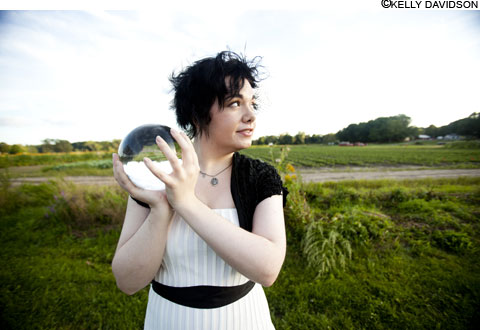
BIG TOP In a campaign more suited for pop stars than debut novelists, Starbucks is plugging The Night Circus as a “Pick of the Week.” |
In May, when Boston author Erin Morgenstern made her first public appearance as a novelist, at the annual BookExpo America in New York, 200 people lined up to see her. Eventually, her handlers had to cut the line off.
>> READ: Excerpt from The Night Circus by Erin Morgenstern <<
A year ago Morgenstern was selling tarot-card paintings on Etsy from her former home in Salem, Massachusetts. Now she is the author expected to become fiction's next pop star. Doubleday bought her book, The Night Circus, for a six-figure advance, and is releasing it in more than two dozen countries. The film rights were optioned by Summit Entertainment, the company behind the Twilight franchise, and David Heyman, whose Hollywood blockbusters include all eight Harry Potter films, has been in talks with Summit to produce. Bookstores all across the country are planning circus-themed release parties. Starbucks is distributing free iBooks download cards for the first 120 pages of The Night Circus, in the same carousels that typically distribute free songs by the likes of Josh Groban. Many in the industry have already anointed The Night Circus as the next Harry Potter.
Last month, a Wall Street Journal reporter wrote an account of The Night Circus publicity machine, questioning whether it has the legs to succeed the world's biggest publishing phenomenon. But its author, a 33-year-old Marshfield native, wasn't thrilled about it.
"I've been avoiding the hype," Morgenstern told me, bristling at her unique position of having experienced backlash well before her book had even hit the shelves.
"It's so frustrating," she said. "I don't think anything could be the next Harry Potter."
MAJOR ARCANA
The circus arrives without warning.
No announcements precede it, no paper notices on downtown posts and billboards, no mentions or advertisements in local newspapers. It is simply there, when yesterday it was not.
Thus read the first few lines of The Night Circus. Unlike its namesake, the book's arrival was anything but subtle.
To promote its new star title, Doubleday launched a Defcon-1 publicity blitzkrieg. It printed a surfeit of galleys and put them into the grasping hands of underpaid booksellers, and sprayed copies all over the Internet through Twitter contests and book-nerd social networks like GoodReads. It landed Morgenstern on an "editor's buzz" panel at BookExpo America, and trotted her out at an author breakfast to schmooze over danishes with groggy librarians from Topeka. It hired six actors, dressed them in tails, top hats, and long red scarves — in Morgenstern's novel, die-hard circus fans wear red scarves to signal their devotion — and had them pass out beribboned bags of promotional caramel corn.
If all goes according to Doubleday's plan, the book will be a best-seller.
This formula has been in place for well over a decade, since the industry agglomerated into a handful of multinational corporate entities. The fact that so few titles get any marketing budget at all, that authors are segregated into two groups — superstars bound for the Fresh Air studios or yeomen who must schedule their own signings — defines the current industry model.